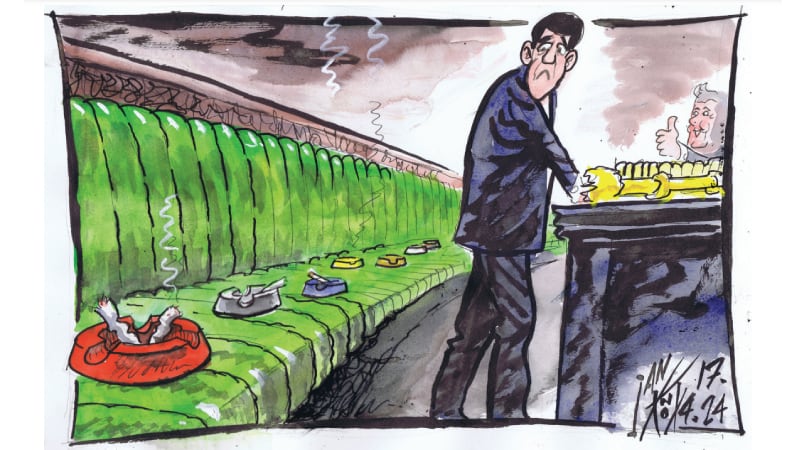Let me correct Manus McDaid (October 27). Nowhere in my letter did I say that I attended a function held by Sinn Féin sponsored Coiste Na Niarrchimi and the reason why I would not attend is exactly why I can be confident that those who did would be largely supportive of Sinn Féin. Manus describes that meeting as one where ex-POWs were in attendance. That is not a description that I used in my letter although it is one that, like Manus, I would concur with. The connotations of that are that the IRA was involved in a war.
He then goes on to say that previous letters from me have me refuting the will of the Irish people.
This leads me to ask a number of questions which I hope he will answer but I very much doubt it.
Firstly, does he regard the IRA campaign up to the Good Friday Agreement as legitimate? If he does, does he claim that it was supported by the democratic wishes of the Irish people who were alive at the time? Thirdly, what were the aims of the IRA campaign?
Was it considered legitimate by him and others because they argued that Britain’s occupation of the six counties was illegitimate. Does he now consider partition legitimate because of the referenda held in the north and south of Ireland following the GFA? If he does, is this the view of Sinn Féin?
You see Manus, it is my view that on the one hand Sinn Féin still regards partition as illegitimate but encourages its supporters to believe that a united Ireland can now be achieved peacefully.
Unfortunately to do so, in Sinn Féin’s view, there are pragmatic actions necessary to follow that path and that outwardly they must support the British institutions of policing and justice but in doing that they must support, or at the very least, turn a blind eye to the continuing injustices that are perpetrated against republicans by those British institutions, not least the continuing brutality against republican prisoners.
It is here that you and others like you have your heads in the sand.
I was merely pointing out to ex-blanket men, women and former republican prisoners generally, that if the brutality they suffered was something that they could justifiably condemn, that they should also condemn similar brutality today being inflicted on republicans.
SEAN O FIACH
Belfast BT11
Poor attempt to portray British army as peacemakers
It’s good to see a unionist, Trevor Ringland, getting space in your paper to air his views. I have never been afforded the same in the two unionist leaning papers here.
In his latest contribution Trevor states the British army saved countless lives but admitted they made mistakes, committed wrongs and were a blunt instrument in a civil environment. This is a very poor attempt to portray them as peacemakers and being involved in what he appears to describe as “minor misdemeanours”.
I wonder if Trevor had been born in west Belfast or any other nationalist area in the north would he still have the same views about this army? Having doors kicked in and male occupants dragged out and interned, subjected to torture, which he admits were wrong ‘if true’.
The massacres in Ballymurphy and Bloody Sunday in Derry, 30 children all under 16 shot dead in cold blood. The unknown number killed by the Military Reaction Force and Force Research Unit of this peace keeping army. The list is endless and no need to go back to their role in Kenya, India etc nor the Miami Showband involvement.
Trevor asks we expose the futility of violence so mistakes of previous generations are not repeated.
This state was created by unionists with the threat of armed response against the British government if the democratic vote in 1918 for an independent Ireland was adhered to.
No-one is born to hate but taught it. I repeat again that the recent conflict would not have occurred if unionists had not burned out innocent families in Bombay St, Conway St etc. Where did they get such evil from? Not too hard to know.
TOMAS O DUBHAGAIN
Belfast BT11
RTÉ archives provide useful history lesson
For those who still harbour the belief that political unionism is capable of respecting Irish citizens in the northern state, the newly released RTÉ archives provide a useful history lesson.
In a speech in the Ulster Hall in November 1968, Ian Paisley made crystal clear his opinion of the nationalist population and their demand for basic civil rights. He described the Civil Rights Movement as ‘a monster who like their priests will not be satisfied but will keep coming back for more’.
It is no surprise to find that almost 50 years later it is this same message Arlene Foster is delivering to Irish language activists and to nationalists generally.
Like Paisley, she likens us to a sub-human species, in her case crocodiles, who can not be satisfied.
Both of these outbursts demonstrate the inherently irreformable nature of the northern state. The unionist mindset that unless Irish nationalists are prepared to abandon their perfectly legitimate ideal of a united Ireland they are doomed to be forever second-class citizens in the six county state.
It is this fascist ideology which has always been and still remains at the core of unionist thinking. To agree to introduce an Irish language act would for them be to concede the unthinkable – that the Irish culture is something to be equally valued and actively promoted.
Both they and the British government must be made to realise that as the strength of the nationalist/unionist populations in the north of Ireland reaches virtual parity, such behaviour need not and will not be tolerated. A political system here in which there is not absolute equality is simply not worth having.
PATRICK FAHY
Omagh, Co Tyrone
LGBTQ women still being left behind
It is welcome news that Belfast Health and Social Care Trust has reversed its proposal to defer access to new patients for treatments within the Regional Fertility Centre until April 1 2018.
The Belfast Health and Social Care Trust provides the regional fertility service for Northern Ireland and the now-reversed proposal would have deferred 320 new patients until April behind people already waiting up to nine months for treatment. But LGBTQ women are still being left behind. In Northern Ireland, people have access to one cycle of fertility treatment but in 2013, the National Institute for Clinical Excellence brought forward Clinical Guidance on Fertility (CG156) which would have increased this to three and allowed equitable access for LGBTQ women.
Yet while Departments of Health across the UK endorsed this guidance, none of the three DUP health ministers saw fit to enhance access to IVF, maybe in part because they would not have liked to enhance access for LGBTQ women. The official line was budgetary pressures.
What might be surprising is the lack of movement by a Sinn Féin health minister who also cited budgetary pressures. It seems that if equality costs money the SF leadership are not much different to the DUP.
Let’s hope any new assembly will bringing us up to date with the rest of the UK.
MAL O'HARA
Green Party NI representative North Belfast







